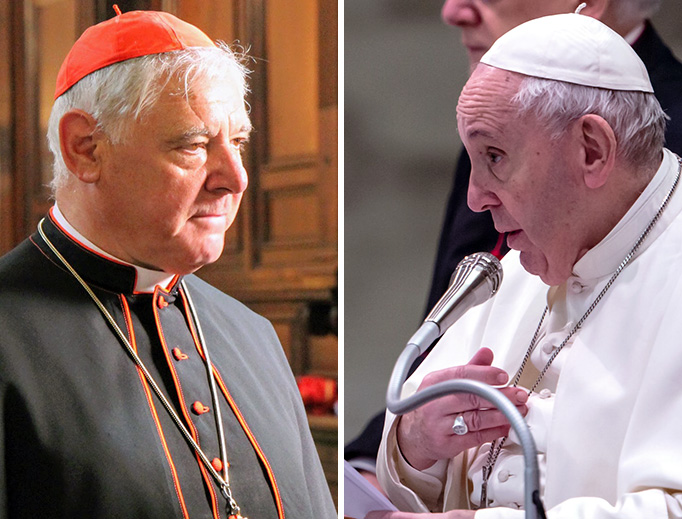Pope Francis Thanks Cardinal Müller for Remarks Published in Register
The Holy Father’s handwritten note of appreciation came in response to Cardinal Müller’s Feb. 12 statement calling Querida Amazonia “a pastoral letter of prophetic power.”

Pope Francis has sent a handwritten letter to Cardinal Gerhard Müller, thanking him for a book the cardinal wrote in 2017, and for a statement he wrote on the Pope’s apostolic exhortation on the Amazon Synod.
“Dear Brother, thank you very much for the book The Pope — Mission and Mandate and for the text on the post-synodal exhortation Querida Amazonia which I liked,” the Pope wrote in the letter dated Feb. 12, the day the apostolic exhortation on the Amazon Synod was published.
Francis was referring to a statement the cardinal wrote on the apostolic exhortation, entitled “A Document of Reconciliation,” published in the Register on the same day as the exhortation’s release.
In that statement, Cardinal Müller praised the Pope for writing Querida Amazonia, saying Francis did not draw any “dramatic and disconcerting conclusions” from the October synod, but rather wrote the exhortation in a “personal and attractive tone.”
“The whole text is a pastoral letter of prophetic power,” the cardinal wrote, adding it is “not an academic study” but rather proclaims “the liberating power of the Gospel of Christ.”
He said the Pope wants to win all people of goodwill for a “positive development” of the Amazon region so that all Christians living there “may experience the uplifting and unifying power of the Gospel.”
The former prefect of the Congregation for the Doctrine of the Faith also noted that, through the document, the Pope “does not want to fuel existing political, ethnic and inner-Church conflicts and conflicts of interest, but rather to overcome them.”
He then proceeded to underline the reasons for ordained male pastors and a celibate priesthood in view of the fact that Francis chose in the exhortation neither to endorse proposals for a possible female permanent diaconate nor to allow the exception of married clergy in the Amazon.
The cardinal’s statement came after he had voiced concerns about the synod, both before and during the monthlong meeting in October, including a detailed six-point critique of the assembly’s instrumentum laboris (working document).
He has also been a vocal critic of other aspects of this pontificate but has steered away from criticizing the Pope personally or directly, instead preferring to act as a kind of bridge between Francis and his detractors.
In the book that Francis mentions but which he said in his letter that he had yet to read, Cardinal Müller examines the role and figure of the pope, including the papacy’s theological and historical aspects.
So far published only in Spanish and German, The Pope — Mission and Mandate looks at the magisterial authority and mission of popes, the doctrine of infallibility, and the development of the papacy from the time of the apostles.
The Pope closed his short note by asking for Jesus’ blessing on the cardinal and for Mary’s intercession, and asking the cardinal to pray for him. He signed it with the words, “Fraternally, Francis.”
- Keywords:
- cardinal müller
- querida amazonia
















